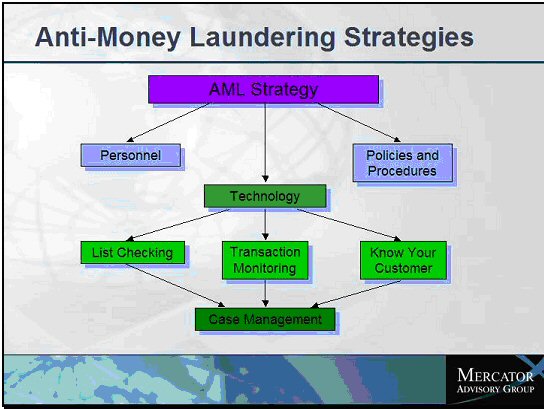Overview
Boston, MA
March 2005
Anti-Money Laundering Technology
NEW RESEARCH REPORT BY MERCATOR ADVISORY GROUP
The Patriot Act is the latest in a lengthy string of government regulations requiring banks to assist law enforcement in fighting crimes by looking for money laundering activities. In this report, Mercator Advisory Group examines today's AML technology environment, including the dramatic changes brought on by the Patriot Act. Additionally, the report examines the likely drives of change in AML technology over the next few years.
Anti-money laundering legislation goes back to the Bank Secrecy Act of 1970, and technology solutions to assist banks with their compliance needs go back to the 1990's. Several factors have converged to dramatically alter the landscape of AML technologies in the last few years. First, the Patriot Act changed both the universe of activities banks were required to monitor for, and also the universe of institutions that are now required to comply with federal regulations.
Second, the penalties for non-compliance have risen dramatically. In the mid 80s, compliance was seen as basically optional, and banks made little effort to fulfill their obligations. A $500,000 fine against Bank of Boston changed that. Even that penalty looks trivial now, as Riggs Bank paid $25 million and AmSouth paid $50 million to settle compliance violations in 2004. These penalties are not going to decrease any time soon.
This report discusses the four parts of an AML technology solution: Know Your Customer, List Checking, Transaction Monitoring and Case Management. The three major forms of transaction monitoring (rules0based systems, neural networks and peer comparisons) are compared and contrasted in significant detail. the report further analyzes the current market for AML technology, including its size and structure, as well as the current state and significant developments within the vendors that provide these services.
Finally, the report discusses the future of AML technology. Mercator Advisory Group believes there are four main factors that will drive the industry's evolution over the next several years, and discusses each in turn:
Regulatory changes
Increasing penalties for non-compliance
Technology changes
Integration with CRM and Risk Management applications
Brian O'Keeffe, Senior Analyst in the Emerging Technology Service for Mercator Advisory Group and the author of the report comments, "Since the passage of the Patriot Act, banks have been rushing to comply with the myriad of mandates sprung upon them. Now that the final rush is over, the industry will switch its focus towards making its MAL programs into something more than just cost centers. The first wave of this change is already upon us: integrating AML into risk management solutions in preparation for Basel II. The second, using all of the data gathered under 'Know Your Customer' to better market to and serve customers, will be a significant issue over the next few years."
One of 5 Exhibits included in this report

Figure 1. Technology is only one piece of a bank's overall AML Strategy
The report contains 30 pages and 5 exhibits.
Members of Mercator Advisory Group have access to these reports as well as the upcoming research for the year ahead, presentations, analyst access and other membership benefits. Please visit us online at www.mercatoradvisorygroup.com.
For more information call Mercator Advisory Group's main line: 508-845-5400 or send email to [email protected].
Book a Meeting with the Author
Related content
The Target Circle Card Program: If at First You Don’t Succeed, Try Again
Target Circle Card program is a standout loyalty program for offering credit and debit card products. However, the program is under pressure, and there are lessons to be learned. F...
2026 Debit Payments Trends
For decades, the checking account has served as the foundation on which all consumer and business payments have rested. But that stability is now beginning to give way to the seemi...
Shifting the Balance: How Consumers Are Using Bank Accounts Today
Consumer payment habits show an interesting blend of change and resilience. As those habits relate to the use of checking accounts—and even fintech offerings that aren’t really che...
Make informed decisions in a digital financial world